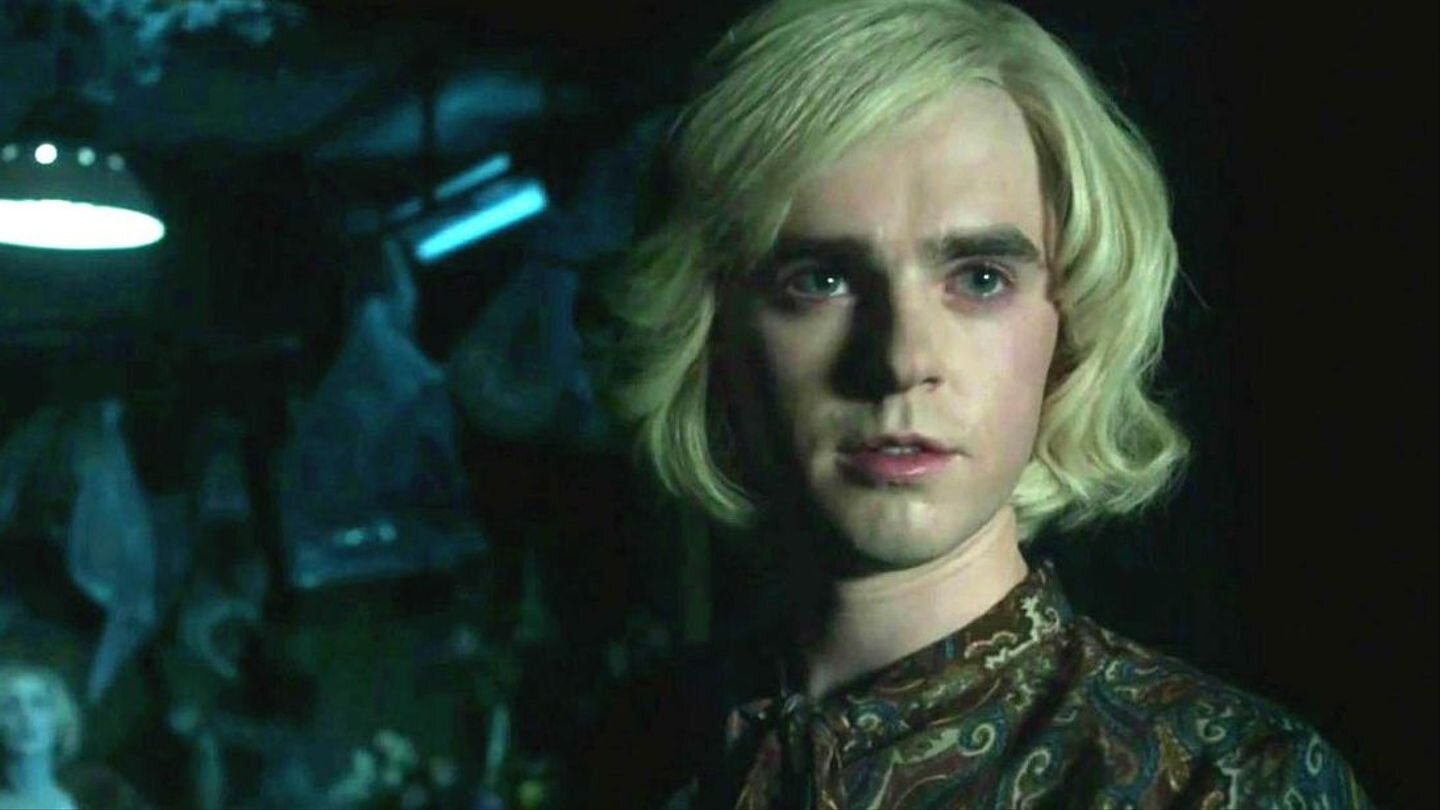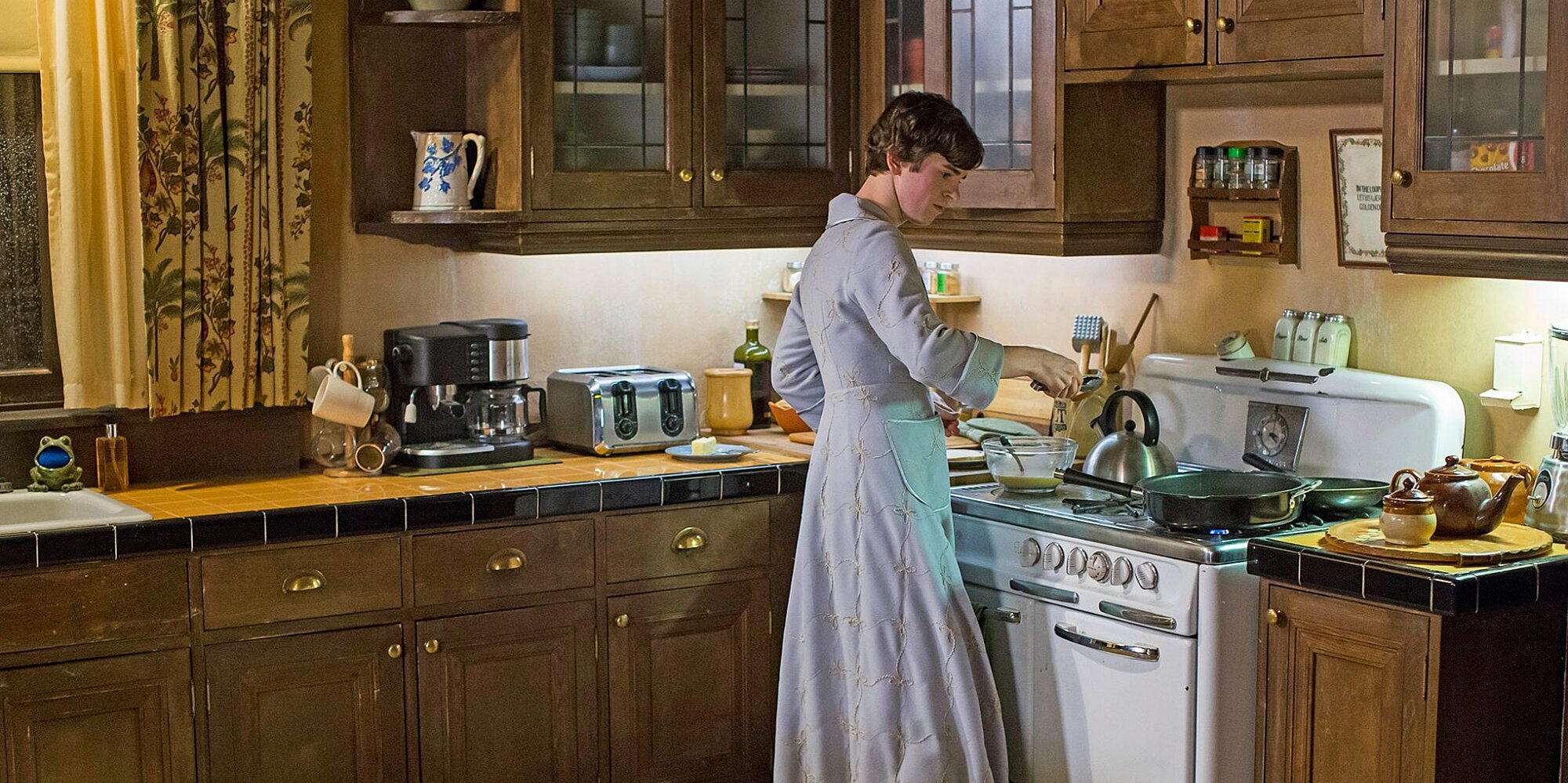[Pride 2021] Coming Out of the Fruit Cellar: The Queerness of 'Bates Motel'
“You’re different, aren’t you?”
“I don’t know, maybe. I think people who are different don’t know they’re different because they have nothing to compare it to.”
“Yeah, you’re different.”
“What’s so different about me?”
“I don’t know, it’s just a feeling I get.”
In the first episode of Bates Motel, Norman (Freddie Highmore) and his attractive classmate Bradley (Nicola Peltz) have the above exchange at a party. It’s one of several details in the pilot that resonate with a queer viewer. When we first see Norman, he’s dozed off while watching an old black and white movie on television. Later, he’s seen listening to classical music on his iPod while waiting for the school bus. And, of course, he’s shown to have an extremely close relationship with his mother, Norma (Vera Farmiga). I, like a lot of gay men, have this in my own life, to the point that Norman and Psycho (1960) have become a running joke with my mom and I.
Vera Farmiga and Freddie Highmore
The character of Norman Bates, originally played by Anthony Perkins in the classic adaptation of the Robert Bloch novel, has historically carried a queer frisson. Last summer, I wrote a deeply personal piece on Norman and Perkins, who was gay, as an important aspect of my own coming out and a sort of personal gay icon. Although not written literally as gay, Norman’s quiet, soft-spoken nature, his strong attachment to his mother (once seen as a “cause” of homosexuality in young men), and his dressing in women’s clothes all lent the character a large amount of queer coding—further reinforced by his closeted portrayal—and Bates Motel, the A&E series prequel to Psycho, continued and expanded on this tradition.
You’ve surely gathered how important Psycho is to me, so I watched the program’s 2013 debut with interest and skepticism—how would this storyline work as a weekly series, and could it possibly live up to my high expectations for my beloved Norman? Thankfully, Bates Motel won me over from the beginning, owing in large part to Highmore’s masterfully appealing performance as the character. His physical resemblance to Perkins was superficially helpful, but more importantly, he imbued the character utterly and completely, giving him tremendous soul and depth. (Both Highmore and Farmiga deserved awards recognition for their superlative work throughout five seasons.) Like the film, Bates Motel keeps us invested in Norman even as his character becomes increasingly violent and even sinister, because he remains deeply vulnerable and even sympathetic.
As the series begins, Norman and his mother relocate to the mysterious town of White Pine Bay, Oregon, following the death of Norman’s abusive father. They open the eponymous motel but quickly discover their new home has a sinister side-- it’s built entirely on illegal drug trade, and the motel was a front for a sex trafficking operation before they bought it. Norman’s relationship with his mother also has a dark side-- they care deeply for each other very much, but their codependence is dysfunctional. Norma has a controlling side and a violent temper, and their closeness blinds each to the faults of the other. Of course, we know they’re ultimately doomed because of where their story is headed-- though part of the show’s brilliance is adding wrinkles of detail and twists and turns. In the final season, Bates Motel reimagines Psycho within its own continuity, deliberately toying with our expectations.
That’s also where the show potentially renders Norman as queer for the first time, although this development is not without precedent. In addition to the queer coding details running throughout the first season, Norman is propositioned by a young man named Phillip in the second. He’s startled and unnerved, but his friend Cody (Paloma Kwiatkowski) reveals that she assumed Norman was gay. When Norman expresses confusion that Phillip and Cody had been making out, Cody assures him the kissing was “just for fun,” perhaps hinting at sexual fluidity and foreshadowing later developments.
When Norman begins to “become” his mother, his femininity is pronounced and appealing. Highmore also does an amazing job of mirroring Farmiga’s speech and mannerisms, and segueing so effortlessly between Norman and Norma that we know immediately which he is in a given moment. He dresses in aprons and robes that suggest gender bending and queer sexuality. In season four’s “Lights of Winter,” Norman and his friend Julian (Marshall Allman) escape the mental institution where Norma has sent him and visit a strip club.
There, Norman and stripper Athena (Alexia Fast) go to a back room and the pressure of the encounter causes Norman to black out and become Norma. Highmore and Farmiga share the scene in alternating shots, meaning that Norma is seen making out with Athena, and Norman appears shirtless with Athena’s feathered wrap around his shoulders. “You’re pretty,” Athena says. “I know,” Norman replies. He looks alluring and quite queer, resembling a handsome twink out for a night at the club. (A blogger captioned a photo of Highmore in the scene “#fierce.”) When the situation at the bar turns violent thanks to Julian’s temper, Norman is rescued and comforted by his sympathetic psychiatrist Dr. Edwards (Damon Gupton). Edwards is the only gay recurring character in the series’ run, which is especially notable because he’s Black and because his sexuality is stated so matter of factly.
Though Psycho’s Dr. Richmond insisted Norman was not “a transvestite,” but “was simply doing everything possible to keep alive the illusion of his mother being alive,” Bates Motel suggests that the character’s drag is not wholly divorced from gender play. This reaches its apex in the final season’s pivotal episode “Dreams Die First,” which introduces Rihanna as Marion Crane. By this point Norman has killed Norma in a botched murder suicide, and is so distraught by her death that he has both preserved her body (as in the original film) and imagined that she is still alive and living with him. He’s acquired a blonde wig and dress to fully “become” Norma. His blackouts have become ever more frequent, and when Norma goes “missing,” along with the car, Norman traces it to the White Horse Bar. He visits the bar during the day and asks the bartender if he saw Norma there the previous night; the bartender says he did but seems confused by the question.
Norman finds scratches on his back from the men in Norma's life
Finally remembering Dr. Edwards’ telling him that “sometimes I see Mother when she’s not there, and sometimes I become her,” Norman returns to the bar that night and is confused to find that the patrons all seem to recognize him, though a woman comments “this is a new look for you, isn’t it?” In the bathroom, a young man (Michael Doonan, credited as “Attractive Man”) tries to kiss Norman, who recoils. “Come on Norma, you weren’t that drunk,” the man jokes.
Norman realizes that he’s been visiting the bar, dressed as Norma, and picking up men. It’s the most explicitly queer moment of the show’s run, and brings up an interesting question—is Norman bi or pansexual? Or can his alternate Mother personality inhabit him so fully that his “actual” sexuality no longer matters? In an article written at the time, series co-creator Kerry Ehrin commented that Norman’s sexuality is “not super defined.” For me, the episode was superlative and represented a kind of fulfillment for a character I had always identified so strongly with. In the end, Norman’s “canon” identity matters less than what he means to the individual viewer, and Highmore’s dynamic and lovable portrayal added a new chapter to my love for him.


![[Pride 2021] Coming Out of the Fruit Cellar: The Queerness of 'Bates Motel'](https://images.squarespace-cdn.com/content/v1/5b39608d75f9eef54c62c3f0/1624729597742-ZXQMRPY0MQYZK18IXR8G/freddie+norma%281%29.jpeg)





![[Pride 2021] Make Your Own Experiences: The Anxiety of Intimacy in Thelma](https://images.squarespace-cdn.com/content/v1/5b39608d75f9eef54c62c3f0/1624734133260-2ISA1VJXNJDHCPAS5OVW/thelma1.jpg)
![[Pride 2021] Heavenly Creatures & The Euphoria of Queer Friendships](https://images.squarespace-cdn.com/content/v1/5b39608d75f9eef54c62c3f0/1624733550877-3HFVE2WI19A955QUS0F7/12GUIDE2-superJumbo.jpg)
![[Pride 2021] Gender: Legend's Demonic Dancing Dress](https://images.squarespace-cdn.com/content/v1/5b39608d75f9eef54c62c3f0/1624731572551-EJRVDJHHENI6BL9MJ2X1/legend_1.jpg)
![[Pride 2021] In Defense of All Cheerleaders Die](https://images.squarespace-cdn.com/content/v1/5b39608d75f9eef54c62c3f0/1624224061135-VSLXGSER31EBM1RVMV9P/All+Cheerleaders+Die.png)
![[Pride 2021] Pinhead is My Husband, but Leatherface is My Child](https://images.squarespace-cdn.com/content/v1/5b39608d75f9eef54c62c3f0/1624731042334-GSDRTO6LVQ0A4V59AB6E/hellraiser-pinhead-is-daddy.jpg)
![[Pride 2021] The Triumph of a Queer Final Girl in Hostel: Part II](https://images.squarespace-cdn.com/content/v1/5b39608d75f9eef54c62c3f0/1624732413696-UPWYZ9LIAHTPIHBBQGNV/bloody-beth-and-stuart.jpg)
![[Pride 2021] Queer Desire 'Behind Her Eyes'](https://images.squarespace-cdn.com/content/v1/5b39608d75f9eef54c62c3f0/1624728853155-F0FXFUEE17PSO2EJQUNJ/BEHIND-HER-EYES-ROB.jpg)
![[Pride 2021 Short Story] Dissonant](https://images.squarespace-cdn.com/content/v1/5b39608d75f9eef54c62c3f0/1624730348013-W9WGZCWYRQISNV5BOUG6/pexels-photo-45055.jpeg)
![[Pride 2021] Why Am I Different? Finding Myself in 'Crypt of the Vampire'](https://images.squarespace-cdn.com/content/v1/5b39608d75f9eef54c62c3f0/1624463550603-UBZK5RAXBBFXPF69L1WM/0+NWT6E4r3fvcY2D-N.jpg)
![[Pride 2021] Herbert West and the Nature of Companionship](https://images.squarespace-cdn.com/content/v1/5b39608d75f9eef54c62c3f0/1624725869166-YLWPP32905H4PZSP4H3Y/IMG_7907.jpeg)
![[Pride 2021 Short Story] The Sun's Coming Up](https://images.squarespace-cdn.com/content/v1/5b39608d75f9eef54c62c3f0/1624462193218-MT559SDD6GUBL2T8M09T/photo-1521194263619-39ecc5b55c61.jpg)
![[Pride 2021] Living in the Margins: Desire and Power in 'Shirley'](https://images.squarespace-cdn.com/content/v1/5b39608d75f9eef54c62c3f0/1624462987331-PBC68BEJ4E1UP27DVD8Z/shirley.jpg)
![[Pride 2021] La Llorona and Our Family Curse](https://images.squarespace-cdn.com/content/v1/5b39608d75f9eef54c62c3f0/1624464623187-5N216Y6XUI72A07TLX8A/robredo-photo4-Equis.jpg)
![[Pride 2021] A Different King of Final Girl: Asexuality and the Slasher](https://images.squarespace-cdn.com/content/v1/5b39608d75f9eef54c62c3f0/1624227349631-VPWXUXXV2L0TEFZIRYUF/Randy-from-Scream-2.png)
![[Pride 2021] The Disappointing Queer Representation of The Pale Door](https://images.squarespace-cdn.com/content/v1/5b39608d75f9eef54c62c3f0/1624734443607-MA95DF1YYUX62PYISMCO/pale_door_4.jpg)
![[Pride 2021] How Critters Became Queerters](https://images.squarespace-cdn.com/content/v1/5b39608d75f9eef54c62c3f0/1624227934397-X2MDXKPRTJAH7IBPE7V8/Critters+3+%281991%29_009+Katherine+Cortez.jpg)
![[Pride 2021] The Trans Subtext in Basket Case and Brain Damage](https://images.squarespace-cdn.com/content/v1/5b39608d75f9eef54c62c3f0/1624226854782-3KWCTRY921X8LAFZOLBA/brain+damage.jpg)
![[Pride 2021] Mother May I?](https://images.squarespace-cdn.com/content/v1/5b39608d75f9eef54c62c3f0/1624225750730-GGR7O1ZIQIC0MOC1T6G8/hereditary-toni-collette.jpg)
![[Pride 2021] All Cheerleaders Die and the Powerful SImplicity of Queer Characters](https://images.squarespace-cdn.com/content/v1/5b39608d75f9eef54c62c3f0/1624224787349-IO3PD3D0CHE2C33NWRS0/allcheer-superJumbo.jpg)
![[Pride 2021] Pride of Frankenstein](https://images.squarespace-cdn.com/content/v1/5b39608d75f9eef54c62c3f0/1623244565304-40XWCIXLR59KMOLGQS1L/Bio+photo.+Could+be+cover%2C+etc.jpg)
![[Pride 2021] Queering The Master of Suspense](https://images.squarespace-cdn.com/content/v1/5b39608d75f9eef54c62c3f0/1623888985926-V6Y6ZD72NOQE82MN62L4/Norman-Bates.jpg)